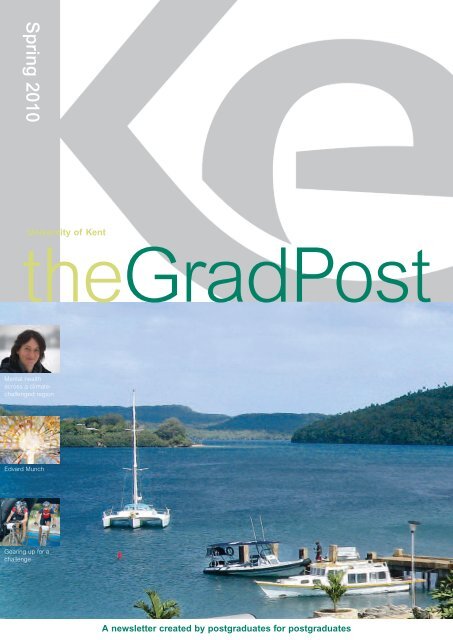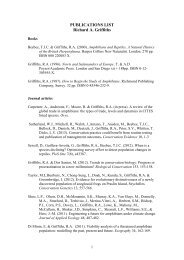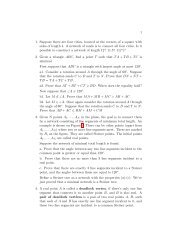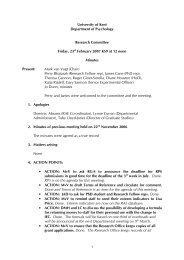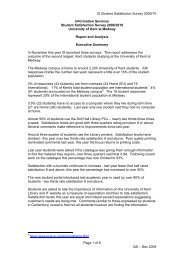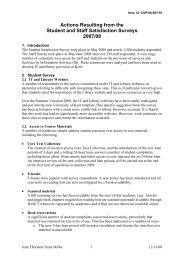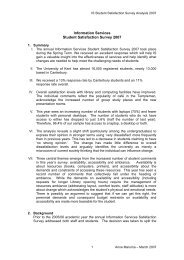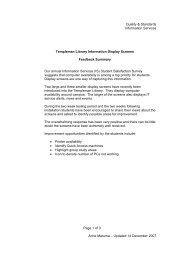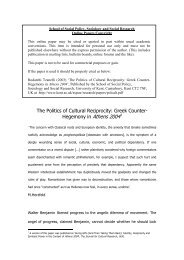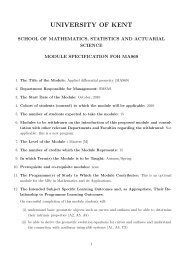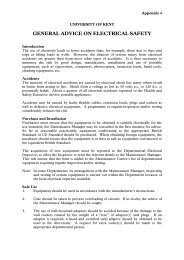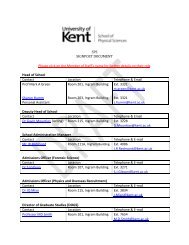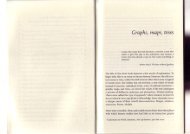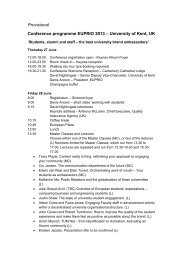S p rin g 2010 - University of Kent
S p rin g 2010 - University of Kent
S p rin g 2010 - University of Kent
You also want an ePaper? Increase the reach of your titles
YUMPU automatically turns print PDFs into web optimized ePapers that Google loves.
Sp<strong>rin</strong>g <strong>2010</strong><br />
<strong>University</strong> <strong>of</strong> <strong>Kent</strong><br />
theGradPost<br />
Mental health<br />
across a climatechallenged<br />
region<br />
Edvard Munch<br />
Gea<strong>rin</strong>g up for a<br />
challenge<br />
A newsletter created by postgraduates for postgraduates
2 theGradPost<br />
Welcome<br />
Welcome to the sp<strong>rin</strong>g <strong>2010</strong><br />
edition <strong>of</strong> The GradPost.<br />
Well, here we are in a brand new decade,<br />
looking forward to what it will b<strong>rin</strong>g. Thanks for<br />
all the positive feedback from the winter<br />
edition <strong>of</strong> The GradPost – your comments and<br />
contributions are really valuable to us. As for<br />
this new edition, our team has worked as hard<br />
as ever and we hope you enjoy reading all the<br />
interesting articles, from the Copenhagen<br />
model conference to the regular PG Snapshot.<br />
Many thanks to the Graduate School, the<br />
Design & P<strong>rin</strong>t Centre and the Publications<br />
team for their brilliant assistance as usual.<br />
Happy reading!<br />
Kate Rees<br />
Chief GradPost Editor<br />
Workshop reflections:<br />
getting a PhD in the UK<br />
Annual Conference<br />
The fifth Annual Conference <strong>of</strong> the<br />
Research School <strong>of</strong> Politics and<br />
International Relations, 21st May<br />
<strong>2010</strong>, Woolf College. For more<br />
information, please visit<br />
www.kent.ac.uk/graduateschool/<br />
community<br />
I am one <strong>of</strong> those people<br />
who find going to London<br />
an intimidating experience.<br />
I struggle to ‘read’ a map or<br />
keep up with the pace in<br />
which the city moves.<br />
Then, there is the Underground. No eye contact.<br />
No encouragement to conversation. Magazines,<br />
novels, iPods, free newspapers, all weapons in<br />
the fight against human connection. To be fair,<br />
this is the same with trying to get a PhD. You<br />
have a destination, you have guides (books,<br />
journals, conferences etc), but you also have<br />
a lot <strong>of</strong> distractions.<br />
I arrived early at Woburn House in Tavistock<br />
Square, a few yards from Euston Station, for<br />
a one-day workshop for international research<br />
students on ‘How to Get a PhD in the UK’ under<br />
the tutelage <strong>of</strong> Pr<strong>of</strong>essor John Wakeford <strong>of</strong> the<br />
Missenden Centre for the Development <strong>of</strong> Higher<br />
Education. It was an insightful experience<br />
informed by the diversity <strong>of</strong> views and<br />
participants.<br />
It can be a strange experience attending a<br />
workshop on how to get a PhD when the only<br />
way to do so is to get on with it. But such<br />
workshops do help. A PhD is daunting. It is a<br />
lonely affair at times. There is no need to crash<br />
into a brick wall when you can find your way<br />
round the wall. Academia is based on dialogue:<br />
dialogue with your subject matter, dialogue with<br />
your supervisor(s), dialogue with your peers,<br />
dialogue with people you meet at conferences<br />
and workshops, dialogue with your flatmates,<br />
and generally dialogue with your surrounding<br />
environment.<br />
Time management is essential, too. Speed is not<br />
only for Formula One racing junkies. Never say<br />
I will take as long as it takes. Manage your time<br />
and resources. Organising your time well is the<br />
ingredient for completion. Never assume you will<br />
have more time in the future and put things <strong>of</strong>f<br />
until then. Deadlines may seem distant but they<br />
aren’t. Other commitments should not take<br />
priority. A PhD is real work and we should care<br />
all <strong>of</strong> the time.<br />
There is a moral to this tale. Never forget to be<br />
good to yourself. It is indeed a long way to go.<br />
Have a life outside <strong>of</strong> work and study. You can<br />
only go so long without seeing daylight before<br />
your mind and body rebel. Eat healthily (eg lots<br />
<strong>of</strong> omega 3 for the brain, ha ha!), exercise and<br />
give yourself time with your friends and family<br />
without feeling guilty. Make sure you get your<br />
sleep. Listen to your body and take breaks when<br />
you need to. Make sure you take holidays where<br />
you actually just relax and don’t think about work<br />
or research at all. I learnt through all this that<br />
getting a PhD is not just about acqui<strong>rin</strong>g a paper<br />
diploma or the ego-enhancing title <strong>of</strong> ‘Dr’, it’s a<br />
collection <strong>of</strong> experiences.<br />
How to Get a PhD in the UK: Workshop for<br />
International Students took place on 2nd<br />
November 2009 at Woburn House, London.<br />
Tinashe Mushakavanhu<br />
PhD English
<strong>University</strong> <strong>of</strong> <strong>Kent</strong> 3<br />
Focus on research<br />
Mental health across<br />
a climate-challenged<br />
region: trans-Pacific<br />
service provision<br />
I joined the School <strong>of</strong><br />
Anthropology and<br />
Conservation as a Graduate<br />
Teaching Assistant at the end<br />
<strong>of</strong> September, so the recent<br />
‘snow days’ are the first<br />
chance that I’ve had to reflect<br />
on the transition from part-time<br />
health worker to full-time<br />
researcher.<br />
I think I’m lucky to be able to maintain a link<br />
between my research theme and my pr<strong>of</strong>essional<br />
experience. Under Dr Michael Poltorak’s<br />
supervision, I’m looking at ‘culturally specific’<br />
models <strong>of</strong> mental health service provision in<br />
Melanesia, with a focus on New Caledonia, a<br />
group <strong>of</strong> islands that are administratively part<br />
<strong>of</strong> France. Mental health service provision is<br />
a multidisciplinary endeavour and the School<br />
<strong>of</strong> Anthropology and Conservation’s double<br />
orientation towards people and their<br />
environments provides the sort <strong>of</strong> academic<br />
mix that will hopefully nudge my research in<br />
the direction <strong>of</strong> practical applications.<br />
As a mature student, I hesitated for quite some<br />
time before taking the decision to continue with a<br />
research degree here at <strong>Kent</strong>. I even handed in<br />
the paperwork in person because I didn’t want to<br />
Copenhagen<br />
Simulation<br />
On Wednesday 2nd December 2009, students<br />
<strong>of</strong> the <strong>University</strong> <strong>of</strong> <strong>Kent</strong> gathered with a<br />
rather original objective in mind: to see if<br />
they could give a boost to the prospective<br />
Conference <strong>of</strong> the Parties (COP-15) <strong>of</strong> the<br />
UN Framework Convention on Climate Change<br />
(UNFCCC) by simulating negotiations and<br />
achieving a common agreement. The<br />
Copenhagen Simulation Project, initiated by<br />
Environmental Law postgraduates and titled<br />
‘We can do it, why can’t they?’, was aimed at<br />
demonstrating that co-operation and concrete<br />
positive results are possible on climate<br />
change issues at the international level.<br />
The Copenhagen Simulation was an easily<br />
replicable role-play event, which sought to<br />
reproduce, in essence, the dynamics and<br />
challenges that faced the international<br />
have the time to change my mind queuing to post<br />
the envelope! After ten years as a community<br />
mental health worker, the initial impetus behind<br />
returning to higher education had been to update<br />
my knowledge <strong>of</strong> current research and policy,<br />
giving me an option to move into case<br />
management. In the process <strong>of</strong> completing a<br />
BSc in Social Science at the Medway campus,<br />
I stumbled into a wild module in Social<br />
Anthropology, then half way through the second<br />
or third seminar, something just clicked into place.<br />
On a day-to-day basis, I do still miss working<br />
with vulnerable people, especially those whose<br />
progress I’d followed through a series <strong>of</strong> care<br />
settings. Although I miss the sense <strong>of</strong> being<br />
involved in people’s lives and <strong>of</strong> making a<br />
difference, research in anthropology allows<br />
me to continue to be engaged with issues on<br />
a similar scale. My research project is still very<br />
much in the planning stages, but what I’ve learnt<br />
about the introduction <strong>of</strong> customary law and<br />
political devolution in New Caledonia encourages<br />
me to carry on explo<strong>rin</strong>g sometimes tense<br />
interactions between people and systems.<br />
negotiation forum in Copenhagen in early<br />
December. Twenty highly motivated participants<br />
representing various countries and blocs were<br />
involved in the climate negotiations. In these<br />
negotiations, the group was divided into two<br />
committees, where the same ten countries<br />
or countries’ alliances were represented. One<br />
committee was confronted with the highly<br />
challenging task <strong>of</strong> settling on a number for<br />
emission cuts, while the other was involved in<br />
negotiating funding mechanisms aimed at<br />
tackling climate change uncertainties and<br />
consequences.<br />
I’m looking forward to organising a pilot study <strong>of</strong><br />
third sector service provision in the field in <strong>2010</strong><br />
and presenting initial results at a conference in<br />
the summer. With the recent severe weather<br />
warnings in <strong>Kent</strong>, I don’t deny that New<br />
Caledonia’s location in the South Pacific has a<br />
definite appeal. The South Pacific as a whole is<br />
at the forefront <strong>of</strong> the predicted effects <strong>of</strong> climate<br />
change; any research that considers the<br />
economic implications <strong>of</strong> social and<br />
infrastructural change needs to take<br />
environmental impact into account. It’s a privilege<br />
to have to look no further than the next desk to<br />
catch up on groundbreaking work on ma<strong>rin</strong>e<br />
conservation or small-island biodiversity. This<br />
is the time <strong>of</strong> year for taking stock and making<br />
resolutions. As I pencil in a task schedule for<br />
the next term, I’m confident that enrolling for a<br />
research degree, however daunting, has given<br />
me more material for resolutions than regrets.<br />
Antonia Knifton<br />
PhD Anthropology<br />
Within the course <strong>of</strong> a day, the participants<br />
reached a credible agreement, providing clear<br />
and equitable agreements on greenhouse gas<br />
emission cuts: 25 per cent compared to the<br />
1990 emission level for developed countries<br />
and 15 per cent for developing countries. They<br />
also agreed upon means for funding and<br />
sha<strong>rin</strong>g knowledge about climate change<br />
issues relating to adaptation and research,<br />
which involved all countries committing to give<br />
one per cent <strong>of</strong> their GDP to a UN fund that<br />
benefitted developing countries. Through this<br />
project, the participants increased their<br />
understanding <strong>of</strong> the UNFCCC conciliation<br />
process while also being able to voice their<br />
belief in a concrete deal.<br />
They achieved this at the <strong>University</strong> <strong>of</strong> <strong>Kent</strong>,<br />
so why can’t our political leaders?<br />
Ma<strong>rin</strong>e Destrez<br />
LLM Environmental Law<br />
Edited by Kylie Grant<br />
MA Creative Writing
<strong>University</strong> <strong>of</strong> <strong>Kent</strong> 4<br />
Edvard Munch<br />
The Scream is possibly one<br />
<strong>of</strong> the most iconic images in<br />
modern culture. It has been<br />
known to grace the covers<br />
<strong>of</strong> magazines, sometimes<br />
connected to health issues,<br />
and its image reinvented into<br />
cufflinks and even inflatable<br />
dolls.<br />
This image has gone far beyond the artist who<br />
created it, as I have <strong>of</strong>ten had to realise when<br />
drawing blank looks at the name ‘Edvard Munch’.<br />
His art is, and has been, the subject <strong>of</strong> my<br />
research and anyone who happens to mention<br />
art to me will inevitably hear about my fascination<br />
with the artist and his genius.<br />
Edvard Munch has in fact created thousands <strong>of</strong><br />
images, the majority <strong>of</strong> which are now held in the<br />
Munch Museum (in Tøyen, Norway), and consist<br />
<strong>of</strong> approximately 1,100 paintings, 4,500<br />
drawings and 18,000 p<strong>rin</strong>ts. This seems<br />
somewhat strange conside<strong>rin</strong>g he is so closely<br />
associated with one painting, <strong>of</strong> which there are<br />
in fact four versions.<br />
There are many interesting facets to Munch’s life,<br />
cove<strong>rin</strong>g different themes in a long life that all<br />
come together in a harmonious, never-ending<br />
way, which make it hard to try and summarise<br />
someone I see as easily one <strong>of</strong> the most<br />
important artists <strong>of</strong> modern life.<br />
Born on 12th December 1863 in Løten, north <strong>of</strong><br />
Oslo (then known as Kristiania), Edvard Munch<br />
lived to the age <strong>of</strong> 81, passing away on 23rd<br />
January 1944. His artistic career started when<br />
he was just 17 and he became a student <strong>of</strong> Frits<br />
Thaulow and Christian Krohg, both artistic<br />
exponents in the Norwegian Naturalist style <strong>of</strong><br />
painting. Munch was prompted from an early<br />
stage to seek a new, original way <strong>of</strong> expressing<br />
the emotions <strong>of</strong> the modern man, and he found<br />
this, in part, from the teachings <strong>of</strong> Hans Jaeger,<br />
the leader <strong>of</strong> the bohemian group in Oslo.<br />
Jaeger’s ethos <strong>of</strong> ‘free love’ and nihilism was<br />
sharply opposed to Munch’s Christian<br />
upb<strong>rin</strong>ging and the strong beliefs <strong>of</strong> his father –<br />
one <strong>of</strong> the many contradictions in Munch’s life<br />
he sought to resolve through his art.<br />
Du<strong>rin</strong>g the 1890’s, Munch created his most<br />
renowned works, including The Scream, and<br />
worked on subjects such as anxiety, death,<br />
sickness, love and jealousy several times in<br />
different motifs and scenarios.<br />
The turn <strong>of</strong> the century saw Munch have an<br />
emotional breakdown, after decades <strong>of</strong> heavy<br />
d<strong>rin</strong>king, over exertion and paranoia as well as<br />
a disastrous encounter with an ex-lover, and so<br />
ended with a stay in a health clinic in<br />
Copenhagen. This saw a new phase in Munch’s<br />
art, with stronger emphasis on life, work and<br />
nature. A freer, brighter use <strong>of</strong> colour is also a<br />
distinct change in the artist’s style, as opposed<br />
to the sombre, more melancholic manner <strong>of</strong><br />
before.<br />
The start <strong>of</strong> his new artistic ethos could be seen<br />
in the commission he won to decorate the new<br />
Oslo <strong>University</strong> Aula (the Hall). It is a series <strong>of</strong><br />
paintings that include subjects on nature, new<br />
life and human’s search for knowledge. The main<br />
work, The Sun, is a personal favourite and<br />
embodies everything I admire in his art, from<br />
the strong colours to the ideology behind it.<br />
Edvard Munch’s last years were spent as a<br />
relative recluse, surrounded by mainly close<br />
friends and his remaining family. He was,<br />
however, awarded the Royal Order <strong>of</strong> St Olav,<br />
by Norway, and his works were becoming<br />
increasingly popular and sought after by<br />
galleries. Upon his death, his remaining works<br />
were left to the city <strong>of</strong> Oslo and this is possibly a<br />
reason why he is not as well known around the<br />
world, since the majority <strong>of</strong> his works have<br />
remained in Norway. However, he is, it seems,<br />
becoming increasingly popular in contemporary<br />
culture, as well with other artists, and so I may<br />
possibly not be drawing so many blank faces at<br />
the mention <strong>of</strong> his name in future.<br />
Sarah Scanlon<br />
MRes Art Philosophy<br />
(Mis)Adventures <strong>of</strong><br />
a postgraduate – the<br />
devil’s in the detail<br />
One <strong>of</strong> my favourite things about being a<br />
PhD student is the fact that my research<br />
topic is incomprehensible to the vast majority.<br />
Sometimes, just for fun, I like to talk science<br />
at people until they lose the will to live. Being<br />
an expert on a tiny part <strong>of</strong> a field has to have<br />
its perks, besides the academic credit <strong>of</strong><br />
course!<br />
For some reason, people seem to find it<br />
really hard to understand what being a<br />
postgraduate in research means or entails.<br />
For the record, no we don’t have lectures,<br />
written exams or spend afternoons in the<br />
pub or watching daytime TV (more<br />
stereotypes – oops). The classic questions<br />
never fail to crop up: what will you do when<br />
you finish? And what does that mean in the<br />
real world? (Thanks to my Gran for that last<br />
one. She just doesn’t get it, bless her.)<br />
I like to answer these questions by saying<br />
that my research is important for everything.<br />
I’m sure you feel the same about yours!<br />
Happy pionee<strong>rin</strong>g!<br />
Anonymous
<strong>University</strong> <strong>of</strong> <strong>Kent</strong> 5<br />
Gea<strong>rin</strong>g up for a challenge<br />
The Woolf College<br />
Student Committee<br />
My brother and I will be<br />
undertaking a unique charity<br />
challenge this year. We will<br />
be participating in the <strong>2010</strong><br />
ABSA Cape Epic mountain<br />
bike race in South Africa on<br />
21st-28th March. It is widely<br />
considered the toughest multistage<br />
mountain bike race in<br />
the world, cove<strong>rin</strong>g 900km in<br />
distance and 16,000m <strong>of</strong><br />
vertical climbing in eight days,<br />
starting in Cape Town in the<br />
Western Cape <strong>of</strong> South Africa.<br />
We will be completing the race in aid <strong>of</strong> the<br />
UK-based charity, Martha Trust, which provides<br />
residential and respite care for people with<br />
pr<strong>of</strong>ound physical and learning disabilities. We<br />
have personal experience <strong>of</strong> the Trust’s care as<br />
our elder brother has severe learning disabilities<br />
and is a wheelchair user. Our fundraising efforts<br />
will allow Martha Trust to purchase specialist<br />
equipment and related services, which can aid<br />
the physical mobility or stimulate the senses <strong>of</strong><br />
people with severe disabilities and thereby<br />
increase the range <strong>of</strong> activities they can<br />
participate in on a daily basis.<br />
For fundraising purposes, we have created<br />
a website www.teamfastforward.org.uk with<br />
information on the challenge, Martha Trust<br />
as our selected charity and our reasons for<br />
undertaking this charity challenge. We hope<br />
you will feel compelled to support us.<br />
I have been a Research Officer at the Personal<br />
Social Services Research Unit (PSSRU) since<br />
2006 and am also a postgraduate student,<br />
having been registered for a part-time PhD<br />
since January 2007.<br />
Theresia Bäumker<br />
PhD in Social Work<br />
It gives me great pleasure to welcome you<br />
all (belatedly) to this new term, which I hope<br />
is going to be somewhat warmer than it’s been<br />
in the previous months! I hope you all had<br />
exciting holidays despite the adverse weather<br />
conditions.<br />
Last term was a memorable one for most <strong>of</strong><br />
us due to the many events that took place and<br />
in which most <strong>of</strong> you participated: from the<br />
elaborate Welcome Week organised by our<br />
predecessors on the Committee to the<br />
successes <strong>of</strong> our college teams. The football<br />
team, for example, earned us our muchdeserved<br />
recognition as a new but formidable<br />
college. We are indeed very grateful for the<br />
support everyone extended to our teams and<br />
look forward to an even more active term!<br />
I should not forget the very successful<br />
postgraduate evening at the Gulbenkian.<br />
Your attendance and support was marvellous<br />
despite the short notice. We are equally<br />
grateful to the Graduate School for their<br />
support and goodwill towards making the<br />
event a success. We are looking forward to<br />
organising many more events in our bid to<br />
build a strong postgraduate community.<br />
This term is certainly going to be a busy one<br />
for many <strong>of</strong> us, so the Woolf Committee has<br />
lined up several regular events with a view to<br />
building a cohesive community and ensu<strong>rin</strong>g<br />
that you relax! For a start, we have taken the<br />
feedback we received seriously and will soon<br />
be releasing a detailed programme <strong>of</strong><br />
activities we plan to host. We are also<br />
proposing to host weekly ‘postgraduate<br />
evenings’ and related events, sometimes in<br />
conjunction with other <strong>University</strong> bodies. We<br />
encourage you to seize these opportunities<br />
and become more engaged in <strong>University</strong> life!<br />
Finally, I wish to reiterate our determination<br />
as a committee to serve the ever-growing<br />
postgraduate community. Your welfare is our<br />
priority, so feel free to contact us. We are more<br />
than willing to assist.<br />
Do have a peaceful term ahead!<br />
Karibuni sana<br />
Erick K’Omolo<br />
Vice-President, Woolf Student Committee<br />
Contact: woolfpresident@kent.ac.uk
The editorial team<br />
Kate Rees – Chief GradPost Editor (PhD Pharmacology)<br />
Tinashe Mushakavanhu (PhD English)<br />
Kylie Grant (MA Creative Writing)<br />
Clare Hetterley (MA English and American Literature)<br />
Sarah Scanlon (MRes Art Philosophy)<br />
Editors<br />
Kate Mansfield, Graduate School Co-ordinator<br />
Suzie Taylor, Graduate School Administration Manager<br />
Contributors<br />
Aaron Simon; Theresia Bäumker; Erick K’Omolo; Rhiannon Binns;<br />
Dr Stephan Rossbach; Antonia Knifton; Ma<strong>rin</strong>e Destrez.<br />
Production<br />
Design and layout: Design & P<strong>rin</strong>t Centre<br />
Subediting: Publications Team<br />
Picture credits<br />
Cover: View <strong>of</strong> Tonga © M S Poltorak<br />
Page 3: Service map, Tonga © M S Poltorak;<br />
Portrait <strong>of</strong> Antonia Knifton (Snow Day) © S Mitchell<br />
Page 4: The Scream (main image) and The Sun (inset) © The Munch<br />
Museum/The Munch Ellingsen Group/DACS <strong>2010</strong><br />
What’s on for PGs?<br />
Woolf College Student Committee, <strong>Kent</strong><br />
Union and the Graduate School have a<br />
range <strong>of</strong> exciting events exclusively for<br />
postgraduates. From wine tasting to trips<br />
around <strong>Kent</strong>, and evening events in<br />
Rutherford Bar to a fantastic end-<strong>of</strong>-term<br />
party, we have something for everyone! We<br />
encourage you all to come out and meet<br />
some <strong>of</strong> your peers. For more information<br />
on events, please visit our website:<br />
www.kent.ac.uk/graduateschool/<br />
community/index.html<br />
PG Snapshot<br />
Name: Aaron Simon<br />
Course: MA in Creative Writing<br />
Transferable<br />
Skills training<br />
Remember to keep an eye on the Transferable<br />
Skills training workshops to ensure you get a<br />
place. There are still places left on the following:<br />
Supervisor: Todd McEwen<br />
Campus: Canterbury<br />
Academic interests: My project is looking to<br />
be a sort <strong>of</strong> coming-<strong>of</strong>-age thing called The<br />
Adventures <strong>of</strong> Cloyd Blank. It stars a man with<br />
an incredibly thick Tennessee accent and a<br />
talking apple named Apple.<br />
Academic hero: I don’t know about hero, but<br />
I’ve had some really good and inspi<strong>rin</strong>g<br />
pr<strong>of</strong>essors: Dr Michael Carniello, Dr Jenn<br />
Fishman, Margaret Lazarus Dean, all from the<br />
<strong>University</strong> <strong>of</strong> Tennessee, and Pr<strong>of</strong>essor Peter<br />
Brown, who teaches here – he is really an allaround<br />
good guy!<br />
Place <strong>of</strong> birth: Houston, Texas – the only city<br />
proud <strong>of</strong> its consistently losing sports teams.<br />
Favourite cheese: Monterey Jack? I’ve heard<br />
that most people in this country don’t even<br />
consider that a cheese, though. Still, better<br />
than saying, “Yellow cheese from Kraft,” right?<br />
Favourite colour: Black to wear, dark green to<br />
look at.<br />
Favourite film: Ah, this one’s a tough question.<br />
I’ll cheat and say a tie between The Good, The<br />
Bad and The Ugly and The Empire Strikes<br />
Back. (The former due to Clint Eastwood<br />
being… well, Clint Eastwood, and the latter<br />
due to its inevitable effect <strong>of</strong> glee and<br />
whistling ‘The Imperial March’ theme for hours<br />
afterwards.)<br />
The best thing about being a postgraduate<br />
student at <strong>Kent</strong> is: The way the schedule<br />
allows me to pursue my own projects and,<br />
generally, churn out an inordinate amount <strong>of</strong><br />
writing. (Seriously, you should see the amount<br />
<strong>of</strong> paper this rough draft business has added<br />
up to; it’s absurd.)<br />
Favourite place to eat on campus: Origins.<br />
The Tex-Mex is just enough like the stuff I ate<br />
back home to give me a warm, tingly feeling<br />
inside.<br />
Top tip for PG study: Space out your work.<br />
Ration it. Doing so saves you from having a<br />
near-nervous breakdown towards essay time.<br />
If you would like to appear in next edition’s<br />
PG Snapshot, please email us at<br />
grad-editors@kent.ac.uk<br />
• One-to-One Academic Writing sessions –<br />
22nd April, 23rd April, 14th May, 11th June,<br />
22nd June and 23rd June<br />
• Routes into Academia: Funding for Early<br />
Career Researchers – 17th March<br />
• Getting the most from your Academic<br />
Relationships – 17th March<br />
• Year 3 Workshop: The End is in Sight – 8th<br />
April.<br />
We have one more Anchor Workshop for firstyear<br />
researchers on 17th March, so please do<br />
book to attend this session if you have not<br />
already attended one.<br />
Please do remember to use the Waiting List<br />
facility on the booking system – many people<br />
get a place on a workshop this way. If you do<br />
add your name to the Waiting List, please ensure<br />
you are available for a last-minute call-up.<br />
Should you have any queries relating to the<br />
Transferable Skills training programme then<br />
please do not hesitate to contact Rhiannon Binns<br />
on skills@kent.ac.uk or visit our website<br />
at www.kent.ac.uk/graduateschool/skills<br />
Rhiannon Binns<br />
Transferable Skills Training Co-ordinator<br />
DPC 109174 1/10 PUB139


